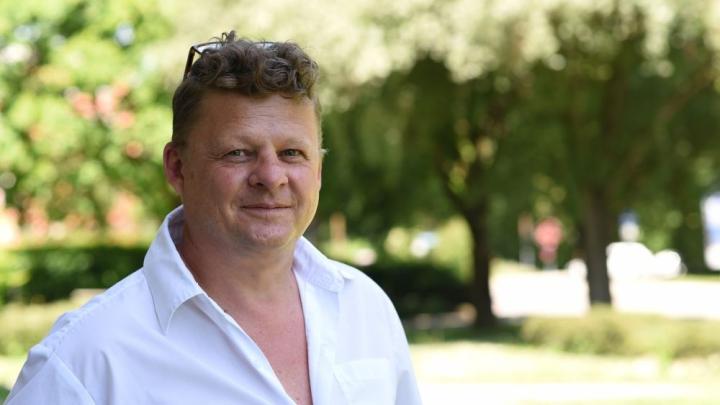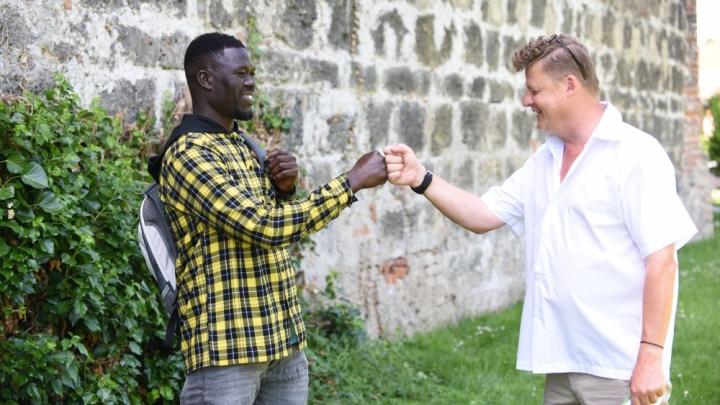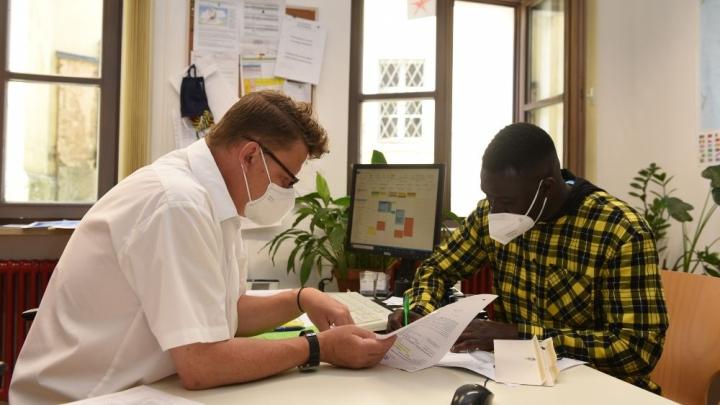Since 2004, the Zentrale Rückkehrberatung Südbayern (ZRB – Central Return Counselling for Southern Bavaria) has been helping asylum seekers, refugees and third-country nationals considering voluntary return to their country of origin. This specialist agency has its headquarters in Augsburg and provides advice from four locations in Bavaria. Markus Fiebiger, ZRB team leader at the Caritas centre in Mühldorf, talks about how they prepare people to successfully reintegrate.
“Trust is our most important currency”

Mr Fiebiger, what issues do your clients bring with them to your return counselling?
Markus Fiebiger: The people who come to us are those who want to go back home or who have to because their application to stay in Germany has been turned down. Around a third of them have already made a decision – because someone has died and they have to take responsibility for the family back home, for example, or because the political situation has changed. Others no longer see any prospects for themselves here after years with exceptional leave to remain, and they need help with organising their return. Each case is different and has to be considered individually. Our advice is independent and objective, and we take our time and discuss their social and health situation as well as their economic and residency position. Our fundamental concern is to offer them guidance and options. This does not necessarily have to result in return.

How do you prepare people for reintegration into their countries of origin?
Our focus as a welfare organisation is on people in a difficult situation due to their personal problems. For instance, we advised a single mother from the Balkans with three children, some of whom were sick. Her legal situation meant she would only have been eligible for a very limited amount of support. Our focus was on the best interests of the children though, so we were able to organise local social and medical services for the family. Staff at our state-run return counselling centres often deal with other areas of activity relating to the immigration authorities. Our major advantage is that we can concentrate solely on our return counselling. This means we have the time and the opportunity to establish and maintain intensive regional and international contacts. We work with the Deutsche Gesellschaft für Internationale Zusammenarbeit (GIZ) GmbH and the European Return and Reintegration Network ERRIN, for example, as well as collaborating with voluntary support groups and local non-governmental organisations.

What is the main focus of your conversations with returnees?
Much of our work is geared towards building trust. It’s important to make potential returnees aware that their counselling sessions won’t have any negative consequences for them. For example, this was the case with a young Senegalese man who came to Germany in the hope of finding work. He came from an agricultural family, had hardly any education and didn’t have a clue what the future held for him back home. At that stage, it was about discovering what potential he had. Business coaching provided by Social Impact and conversations with advisors at the Senegalese-German Centre for Jobs, Migration and Reintegration (CSAEM) helped him with that. He’s now going to farm his family's land – a circle of helpers also collected donations, which enabled him to make additional purchases that he can put to good use for his new start.
How important is your cooperation with the GIZ advisory centres in the countries of origin?
Just the thought of having direct local contacts after returning home gives somebody confidence. We generally sense a lot of uncertainty among returnees, and a fear that their plans involving the return assistance programmes could ultimately turn out to be empty promises. This makes it important for them to know that there are other support structures in their countries of origin and people who will continue to help them. They can also still contact us, and we’ll get involved if there’s a problem.
How does this transnational support work in practice?
In many cases we establish contact with the local advisory centres before our clients return, and where possible we involve these centres in preparing reintegration measures at an early stage. We get the local GIZ advisors involved in our online sessions, and clarify the plans and needs which the respective person will be bringing with them to their home country. A network with various partners in both countries can often achieve a great deal.
Can you think of a specific example?
We had a Nigerian who desperately wanted to set up a car repair shop, so everyone involved put together a really good package. This man in his early 40s was illiterate, and had worked in various garages before without any training or certificates.
In consultation with the network, he was given a fast-track literacy course at the Bavarian Employers Association Vocational Training Centres (bfz) for six months, developed a business plan with Social Impact, was given an internship placement and learned about the latest workshop technology, including electronic vehicle analysis. A group of helpers finally launched a campaign and raised some more funds to equip his workshop. All the processes came together almost to perfection. Fortunately this man came to us at an early stage, because it takes time to organise such elaborate preparation.
Was it worthwhile?
Absolutely. He’s now linked up with another returnee in his region who set up his own welding business with a workshop and who employs two people. The man is now very happy with his situation, but he did put in a lot of effort as well! Ultimately it always comes down to the returnee's personality. We help create career opportunities for returnees – but accepting these offers and making the most of them requires them to be motivated and show initiative.
As of: 07/2021



